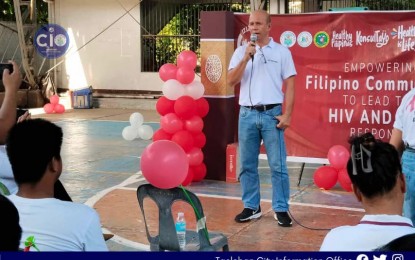
FIGHTING HIV/AIDS. Dr. Danilo Ecarma, officer-in-charge of the Tacloban city health office, speaking in one of the HIV/AIDS prevention drives in this undated photo. Concerns have been raised over rising cases of human immunodeficiency virus and acquired immunodeficiency syndrome (HIV/AIDS) in this city, with infected persons getting younger. (Photo courtesy of Tacloban City Health Office)
TACLOBAN CITY – Concerns have been raised over rising cases of human immunodeficiency virus and acquired immunodeficiency syndrome (HIV/AIDS) in this city, with infected persons getting younger.
Dr. Danilo Ecarma, officer-in-charge of the city health office here, revealed that based on data from 1984 until September 2023, HIV-infected persons are getting younger.
At least 277 individuals were diagnosed with HIV, and 167 of them, or 58 percent of the cases, are within the 25–34 age bracket, and 77 (27 percent) are 15–24 years old. The remaining 33 cases are 35 to 49 years old.
“Based on a report from the city epidemiology surveillance unit, the city logged eight cases in September alone, higher than the five cases recorded in August 2023,” Ecarma said.
The leading mode of transmission of HIV/AIDS remains male-to-male sex, multiple sex partners, and sex with the opposite gender.
Aside from unprotected sex and mother-to-child transmission, other ways to get infected with diseases include the transmission of contaminated blood.
“We always emphasize the importance of regular check-ups and HIV testing every six months since it is free at the city health office and treatment hub at the Eastern Visayas Medical Center. We recommend those potentially infected persons (to) undergo counseling with our accredited counselors before testing,” Ecarma added.
The official advised the suspected or infected HIV/AIDS patients to take counseling sessions seriously to fight depression and cooperate in the treatment process to minimize the infection.
The city health office and partner agencies have been intensifying their information, education, and communication drive in schools to prevent the spread of HIV.
The Department of Health targets that by the end of this year, some 90 percent of all people with HIV will be aware of their health status and start taking medications.
HIV is a virus that attacks the immune system. If untreated, a person’s immune system will eventually be destroyed, according to Avert, an organization based in the United Kingdom.
AIDS, on the other hand, refers to a set of symptoms and illnesses that occur at the very final stage of HIV infection. (PNA)
